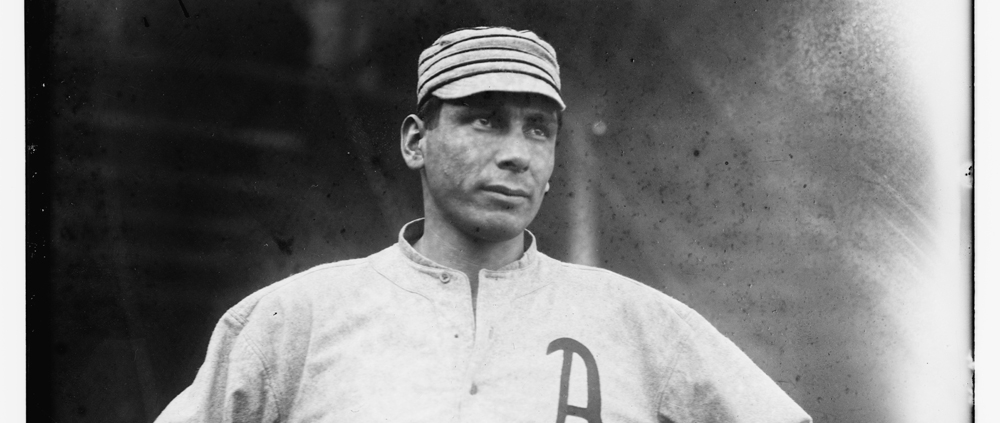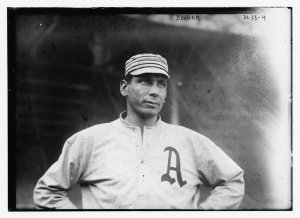October 26, 1911: Bender tosses 4-hitter as A’s crush Giants to capture second straight championship
“The old White Elephant stands above the great throbbing world of baseball,” gushed sportswriter Jim Nasium following the Philadelphia Athletics crushing 13-2 victory over the New York Giants in Game Six of the 1911 World Series to capture their second consecutive title.1 “The Athletics were positively savage the with the bat,” opined scribe Thomas S. Rice, by setting a new Series record for the most runs scored in a game and the largest margin of victory.2 The “real hero of the Series,” wrote the Brooklyn Eagle, was not the A’s offense, but rather their pitcher Chief Bender, who tossed his second complete-game victory in three days.3 Bender exhibited “cool and calculating leadership” and “never lost his head,” wrote the New York Tribune,4 while the New York Times praised him as “one of the greatest slabmen of his time” and a “cool, brainy, unshakable flinger.”5
Skipper Connie Mack’s high-scoring A’s (101-50) were heavily favored going into the Series, but the first five games were hardscrabble affairs, each won by one or two runs and featuring a total of just 25 runs scored. Manager John McGraw’s Giants (99-54) squeaked out their second one-run victory in Game Five at the Polo Grounds, sending the teams back to Philadelphia on the latest day a World Series Game had ever been played (a record that stood until 1981). The fall classic was in its 13th day, prolonged by six consecutive days of rain between Games Three and Four.
Mystery surrounded the skippers’ choices for starting pitchers. McGraw, who had relied on only his stars Christy Mathewson (26-13) and Rube Marquard (24-7) thus far, chose Red Ames among the four who warmed up (Ames, Doc Crandall, Hooks Wiltse, and Marquard). The curveballing Ames, coming off an 11-10 campaign to push his record to 95-71 in his nine-year career, had made his first Series appearance the day before, tossing four scoreless frames. After Jack Coombs (28-12) severely injured his groin in Game Five and was lost for the remainder of the Series, Mack needed to be strategic and sent his three other primary regular-season starters to warm up. Mack surprised everyone by choosing Bender over Eddie Plank (23-8), who had started only Game Two 10 days earlier, though had taken the loss in relief in Game Five, and Cy Morgan (15-7), who hadn’t pitched since October 5.
The 27-year-old Bender had long proved to be a big-game pitcher, as well as one of the Tall Tactician’s favorites. He had a 142-81 slate in nine seasons, including 17-5 in 1911, and had excelled in the World Series, where he owned a 1.54 ERA in 52⅔ innings, having completed all six of his starts. He had lost the Series opener to Mathewson, 2-1, tossing 137 pitches and fanning 11, then handed Big Six his second Series defeat in Game Four, 4-2.6 “They say the Chief isn’t good for a quick comeback,” quipped the New York Sun, echoing an oft-repeated critique of Bender’s durability that revealed as much about the racism Bender faced as reality.7
Shibe Park drew a less-than-capacity crowd of 20,485 spectators, almost 6,000 fewer than for Game Two, on a clear, cool, autumnal Thursday afternoon with temperatures in the 50s.8 About a half-hour before the 2 P.M. start time, fans from the overcrowded bleachers were permitted onto the field, where they were cordoned off by rope in left field and right field.9
The “baseball maddened crowd was stunned” in the first inning, wrote the Inquirer, when Larry Doyle lined a one-out hit off the right-field fence, just missing a home run, and the ball fell into the crowd for a ground-rule double.10 Two batters later, Red Murray hit a routine fly ball that should have ended the frame, but Danny Murphy made a “scholastic muff” enabling Doyle to score.11 Murphy was struggling. His flub attempting to catch a foul ball enabled the Giants to score the game-winning run in the 10th inning the day before, but he would emerge as an offensive hero in this game.
The A’s tied the game in the third on Bris Lord’s one-out double scoring Ira Thomas, who had led off with a walk. It was the first of the A’s 13 unanswered runs, highlighted by two big innings. The Mackmen blew it open in the fourth with consecutive singles by Home Run Baker and Murphy. Graybeard Harry Davis, forced into action because of 20-year-old emerging star Stuffy McInnis’s season-ending hit-by-pitch injury on September 25, grounded to second baseman Doyle, who hesitated, looked home and then to first base before firing to the catcher, but Baker scored easily. Though no error was given, the Giants committed two on the next batter leading Jim Nasium to quip that their defense played like “a bunch of trolley leaguers on a barn storming tour through the mustache-cup belt.”12 It began when Ames fielded Jack Barry’s routine sacrifice bunt. His throw to first bounced off Barry’s head and into right field, and Murphy scored. Retrieving the orb, Murray heaved it wildly over shortstop Art Fletcher’s head and into the wall along the left-field foul line, enabling Davis and Barry to score and give the A’s a 5-1 lead. The comedy of errors “broke the Giants nerve and defense,” quipped the Inquirer.13 Wiltse replaced Ames to start the fifth. The A’s padded their lead in the sixth on Murphy’s leadoff double “over [Fred] Snodgrass’s head” and Barry’s sacrifice fly.14
The baseball world wondered when the A’s offense would explode. Mack’s squad had led the majors by scoring 5.7 runs per game and posting a composite .296 batting average, featuring five starters who batted at least .310, led by Eddie Collins (.365), Baker (.334), and Murphy (.329). The wait ended in the seventh when the A’s “riddled [the Giants] with a fusillade of ringing hits,” noted the Times, scoring a then-World Series record seven runs in an inning.15 After Bender flied out, the next eight batters reached base, “overwhelming the Giants, scoring runs galore, swatting balls to every corner of the lot,” wrote the Inquirer.16 After Lord and Rube Oldring singled, Fred Merkle muffed Ames’s throw on Collins’s sacrifice bunt, resulting in the first run. Baker, Murphy, and Davis all connected for RBI singles. Barry doubled to plate another, finally mercifully sending Wiltse to the showers. Marquard came on in relief, but his second pitch to Thomas crossed up catcher Chief Meyers, “dented the screen in the grandstand,” and Davis and Barry scored the final two runs of the inning. “The hollowness of the one-sided victory,” opined the Tribune, “took much of the enthusiasm out of the crowd.”17 With the outcome of the game and Series secure after seven innings, spectators began to leave Shibe Park.
Bender should have had a shutout in the game. The A’s led the majors with the fewest errors and the highest fielding percentage, but were uncharacteristically sloppy. The 6-foot-2 right-hander yielded only four hits, yet pitched with men on in every inning except the fourth when he retired the side on three pitches. Barry, who had led all big-league shortstops with a .944 fielding average, committed three errors (in the second, seventh, and eighth). Despite the miscues, the Giants had two men on base only once. In the fifth, Meyers singled with two outs and Doc Crandall, pinch-hitting for Ames, drew a free pass. With the 23rd pitch of his most taxing inning, Bender retired Josh Devore on “a high, fast drop,” according to the Inquirer, which caught him looking on a 3-and-2 count.18 The A’s fifth and final error led to the second Giants tally, and like the first it was unearned. With one out in the ninth, Herzog’s single to center caught Oldring “loafing.”19 Oldring fumbled the ball, allowing Herzog to reach second. He advanced another station on Bender’s wild pitch, then tallied the Series’ final run on Fletcher’s groundout. In a remarkable gesture of sportsmanship that reflected the Athletics’ close-knit bonds, Harry Davis motioned to McInnis on the bench to take his place. In his last season as a player, Davis had agreed months earlier to become the manager of the Cleveland Naps in 1912. In a conclusion befitting the A’s championship season, McInnis recorded the last out, receiving Baker’s throw on Art Wilson’s grounder to end the game in 2 hours and 12 minutes.
The A’s captured their second straight championship in a Series that was more competitive than the final game suggested. The biggest difference in the Series was that the A’s trio of pitchers – Coombs, Bender, and Plank – logged every inning and limited the Giants to a .175 batting average on 33 hits. Bender needed just 102 pitches (74 strikes) to complete Game Six. Had there been an MVP award, he would have earned it: three complete games and a 1.04 ERA in 26 innings. The star on offense was Home Run Baker, who produced a Series-most seven runs, nine hits, and five runs batted in (tied with Davis), and belted two of the Series’ three round-trippers.
SOURCES
In addition to the sources cited in the Notes, the author accessed Retrosheet.org, Baseball-Reference.com, SABR.org, and the following newspaper articles:
Bulger, Bozeman. “Hitting’s the Main Thing in Baseball, and That’s Why Athletics Won Title,” (New York) Evening World, October 27, 1911: 22.
“Coombs Badly Injured,” Philadelphia Inquirer, October 27, 1911: 8.
Mathewson, Christy. “Mathewson Gives Praise to Macks,” Philadelphia Inquirer, October 27, 1911: 10.
NOTES
1 Jim Nasium, “Macks Make Every One of the 13 Hits Count a Run,” Philadelphia Inquirer, October 27, 1911: 10.
2 Thomas S. Rice, “Remarkable Series Ended with Slaughter of the Giants,” Brooklyn Eagle, October 27, 1911: 25. The A’s 13 runs remained the World Series record until the New York Yankees pounded the New York Giants 18-4 in Game Two of the 1936 fall classic, which also set a new record for the largest margin of victory in a World Series. The A’s 13 runs were matched by the Giants in Game Three in 1921 in their defeat of the Yankees, 13-5; and by the Yankees in Game Four in 1932, defeating the Chicago Cubs, 13-6. The A’s 11-run margin of victory was tied by the St. Louis Cardinals in Game Seven in 1934 when they beat the Detroit Tigers, 11-0.
3 Rice.
4 “Athletics Capture the World Series Title,” New York Tribune, October 27, 1911: 1.
5 “Athletics Are the Champions,” New York Times, October 27, 1911: 1.
6 Bender’s total of 137 pitches is from “Bender Pitched 102 Balls to Giants,” Philadelphia Inquirer, October 27, 1911: 10.
7 “Athletics Rout the Giants,” (New York) Sun, October 27, 1911: 1. Bender averaged 25 starts and 21 complete games among his 31 appearances from 1903 to 1911. He suffered poor health and arm miseries most of his career, yet Mack recognized his value and gave him extra time between starts.
8 “Yesterday’s Local Weather Report,” Philadelphia Inquirer, October 27, 1913: 2.
9 “Athletics Capture the World Series Title.”
10 “Macks Bat Out Victory; Scoring Runs with Ease,” Philadelphia Inquirer, October 27, 191: 1.
11 “Turning Point Was the Fourth Inning,” Philadelphia Inquirer, October 27, 1911: 1.
12 Jim Nasium.
13 “Turning Point Was the Fourth Inning.”
14 “Athletics Rout the Giants.”
15 “Athletics Are the Champions.”
16 “Macks Bat Out Victory; Scoring Runs with Ease.”
17 “Athletics Capture the World Series Title.”
18 “Bender Pitched 102 Balls to Giants.”
19 Jim Nasium.
Additional Stats
Philadelphia Athletics 13
New York Giants 2
Game 6, WS
Shibe Park
Philadelphia, PA
Box Score + PBP:
Corrections? Additions?
If you can help us improve this game story, contact us.



